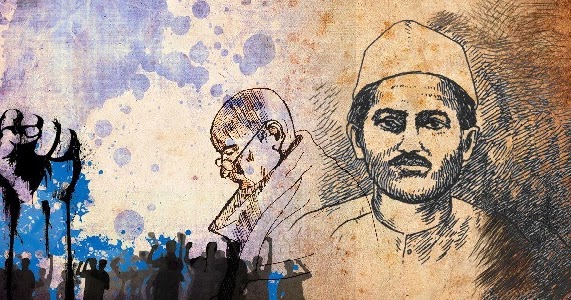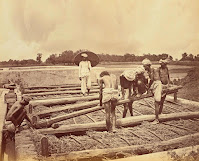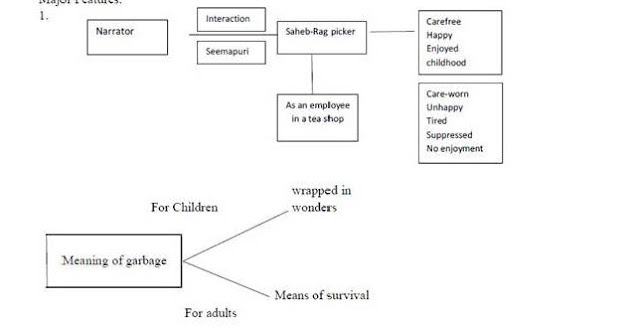Indigo
This chapter belongs to Mahatma Gandhi, a prominent political leader of India known as ‘Bapu’(The Father of The Nation). His role in the freedom movement of India is unforgettable.
About The Author
‘European and Asian Publications’. As a journalist, he lived through and reported the Second World War. He was a Jewish‐American who was greatly influenced by Gandhiji’s use of non‐violence and spiritualism as political tools. He wrote highly acclaimed books on Gandhi and Lenin. He died at the age of 73 on 15 January 1970 in Princeton, New Jersey, USA.
About The Chapter
This chapter is an excerpt from Louis Fischer’s famous book ‘The Life of Mahatma Gandhi’. The writer observed Gandhiji’s work to fight for the cause of the voiceless, downtrodden Indians who reeled under the rule of the indifferent, oppressive colonial British rule. ‘Indigo’ is one of the many episodes of Gandhi’s long political struggle.
The chapter describes the Champaran visit of Mahatma Gandhi which was undertaken casually on the entreaty of a poor peasant, Rajkumar Shukla, in the expectation that it would last a few days, occupied almost a year of Gandhi’s life.
The story describes Gandhiji’s struggle for the cause of the sharecroppers of Bihar and how he asked the Britishers to leave the country.
It highlights the leadership shown by Gandhi to secure justice for oppressed people.
The chapter describes the Champaran visit of Mahatma Gandhi which was undertaken casually on the entreaty of a poor peasant, Rajkumar Shukla, in the expectation that it would last a few days, occupied almost a year of Gandhi’s life.
The story describes Gandhiji’s struggle for the cause of the sharecroppers of Bihar and how he asked the Britishers to leave the country.
It highlights the leadership shown by Gandhi to secure justice for oppressed people.
About The Characters
- Gandhiji‐ A prominent political leader of India (The Father of The Nation).
- Rajkumar Shukla‐ A poor, emaciated but resolute peasant of Champaran.
- Rajendra Prasad‐ A lawyer who later became the First President of India.
- J.B. Kripalani‐ A professor of the Arts College in Muzzafarpur.
- Malkani‐ A Government school teacher.
- Sir Edward Gait‐ The Lieutenant Governor.
- Mahadev Desai and Narhari Parikh‐ Volunteer teachers. Kasturbai‐ Gandhi’s wife.
- Devdas‐ Gandhi’s youngest son.
Main Points
Rajkumar Shukla’s request to Mahatma Gandhi
Gandhi starts narrating the incident which made him decide to urge the departure of the British from India. This incident occurred in 1917.
Gandhi had gone to the December 1916 Annual Convention of the Indian National Congress Party in Lucknow. A poor, emaciated, and illiterate peasant named Rajkumar Shukla came to him and requested to come to his district, Champaran. The peasants of Champaran were sharecroppers and Rajkumar Shukla was one of them. He was a resolute man who had come to the Congress Session to complain about the injustice of the landlord system in Bihar.
At that time Gandhi had an appointment and had to visit some other parts of India. Rajkumar Shukla patiently accompanied him everywhere. Impressed by his determination Gandhi agreed to accompany him to Champaran after his Calcutta visit. When Gandhi went to Calcutta after some months, he found Shukla already present there.
Gandhi had gone to the December 1916 Annual Convention of the Indian National Congress Party in Lucknow. A poor, emaciated, and illiterate peasant named Rajkumar Shukla came to him and requested to come to his district, Champaran. The peasants of Champaran were sharecroppers and Rajkumar Shukla was one of them. He was a resolute man who had come to the Congress Session to complain about the injustice of the landlord system in Bihar.
At that time Gandhi had an appointment and had to visit some other parts of India. Rajkumar Shukla patiently accompanied him everywhere. Impressed by his determination Gandhi agreed to accompany him to Champaran after his Calcutta visit. When Gandhi went to Calcutta after some months, he found Shukla already present there.
Gandhi on His Way to Champaran
While going to Champaran, they went to Patna to Rajendra Prasad’s house. He was a lawyer of Patna who represented the cases of sharecroppers in the court. He was out of town. The servants knew Shukla so they allowed them to stay there but Gandhi was not permitted to draw water from the well taking him to be untouchable.
Gandhi decided to visit Muzzafarpur before Champaran to obtain more complete information about the condition prevalent in the area. He sent a telegram to Professor J.B. Kripalani who received them at the station with a large body of students. Gandhi stayed there for two days in the home of professor Malkani, a government teacher. According to Gandhi, it was an extraordinary thing in those days because, in smaller localities, the Indians were afraid to show sympathy for advocates of home rule.
When the sharecroppers of Champaran came to know about the arrival of Gandhi for their sake, they came rushing to Muzzafarpur to meet their Champion. Muzzafarpur lawyers met Gandhi. They told him about their cases and reported the size of their fee. Gandhi chided them for collecting the high fees. He concluded that the peasants were so crushed and fear-stricken that going to law courts was useless. The real relief for them was to be free from fear.
Gandhi decided to visit Muzzafarpur before Champaran to obtain more complete information about the condition prevalent in the area. He sent a telegram to Professor J.B. Kripalani who received them at the station with a large body of students. Gandhi stayed there for two days in the home of professor Malkani, a government teacher. According to Gandhi, it was an extraordinary thing in those days because, in smaller localities, the Indians were afraid to show sympathy for advocates of home rule.
When the sharecroppers of Champaran came to know about the arrival of Gandhi for their sake, they came rushing to Muzzafarpur to meet their Champion. Muzzafarpur lawyers met Gandhi. They told him about their cases and reported the size of their fee. Gandhi chided them for collecting the high fees. He concluded that the peasants were so crushed and fear-stricken that going to law courts was useless. The real relief for them was to be free from fear.
The Sharecropping Arrangement
Most of the arable land in Champaran was divided into large estates owned by English men and worked by Indian tenants. The chief commercial crop was indigo. The owner forced them to plant fifteen percent of their holdings with indigo and surrender the entire indigo harvest as rent.
In the meantime, Germany had developed synthetic indigo. British landlords freed the Indian farmers from the fifteen percent of the arrangement but asked them to pay compensation.
Meanwhile, the news of synthetic indigo reached the sharecroppers. They felt cheated and became resentful. They wanted their money back.
At this point, Gandhi arrived in Champaran.
Gandhi’s Movement in Champaran
Gandhi started gathering details. He visited the secretary of the British landlord association who refused to give information to an outsider. Then he visited the British Commissioner of Tirhut Division who advised him to leave Tirhut.
Instead of leaving Tirhut Gandhi to proceed to Motihari where he was greeted by a vast multitude. Using a house as headquarter, he continued his investigation. He also decided to go and see a peasant who had been maltreated.
Gandhi was ordered to come back. He did so. Thereafter he was served with an official notice to quit Champaran. He signed it and wrote that he would disobey the order. He was summoned to appear in the court the next day.
All night Gandhi remained awake. He wired Rajendra Prasad to come from Bihar with influential friends. He also wired a full report to the Viceroy.
The news of Gandhi being in trouble with the authorities spread fast. Thousands of peasants came from Motihari and demonstrated in front of the courthouse. This was the beginning of their liberation from fear of the British.
The official felt powerless but Gandhi helped them to regulate the crowd. This was proof that the British authority was no longer unchallengeable.
The government was baffled. The prosecutor wanted the trial to be postponed. He protested against the delay. He read a statement pleading guilty. He clarified that he broke the law to render humanitarian and national service. He claimed to have no disrespect for the law but greater respect for the voice of his conscience.
The government was confused and ultimately set him at liberty, but kept the judgment reserved. Rajendra Prasad and other lawyers reached there. They held a discussion with Gandhi about what would they do if Gandhi sentenced to prison. They consulted and told Gandhi that they were ready to follow him to jail. Gandhi exclaimed, “The battle of Champaran is won”.
The Lieutenant Governor dropped the case against Gandhi. This was the first triumph of civil disobedience in modern India.
Gandhi and his associates moved forward to conduct an inquiry into the complaints of farmers. The whole area was filled with the air of investigation and protest. The notes were made and documents were collected.
After four meetings with the Lieutenant Governor, an official commission of inquiry was made. It consisted of landlords, government officials, and Gandhi as the only representative of peasants.
A lot of evidence was collected against the landlords. They have left no choice but to agree in principle to refund the money to the peasants. They expected Gandhi to ask for the full amount but he demanded just fifty percent. They offered him twenty-five percent and to their amazement, Gandhi agreed to it.
He explained that the amount of refund was less important than the fact that the landlord had been obliged to surrender part of the money and, with it, part of their prestige.
Now the peasants saw that they had rights. They learned a lesson of courage.
Gandhi’s Effort to Remove the Social and Cultural Backwardness of Champaran
Gandhi wanted to remove the social and cultural backwardness in the villages of Champaran. Health conditions were also miserable. He appealed for volunteers to help. Several people came forward for this noble purpose. His wife and his youngest son also arrived to help.
Primary Schools were opened. Kasturbai taught the ashram rule on personal cleanliness and community sanitation. Gandhi got a doctor to volunteer his service for six months.
Primary Schools were opened. Kasturbai taught the ashram rule on personal cleanliness and community sanitation. Gandhi got a doctor to volunteer his service for six months.
Champaran Episode: A Turning Point
The Champaran episode was a turning point in Gandhi’s life. He declared that Britishers could not order him about in his own country. In whatever he did, he tried to mold a new free Indian who could stand on his own feet and thus make India free.
A Lesson in Self Reliance
Charles Freer Andrews, a devoted follower of Gandhi came to bid him goodbye before going on a tour of duty to the Fiji Islands. Gandhi’s lawyer friends wanted him to help them. Gandhi strongly opposed this suggestion by saying that this showed the weakness of their heart. When the cause was just, they must rely upon themselves to win the battle. Gandhi in this way taught them a lesson in self-reliance.










